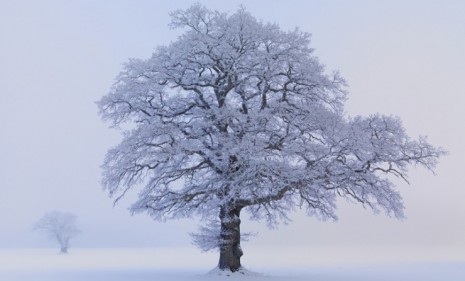Are we facing a mini Ice Age?
Three new studies forecast a possible global cooling — but it's not time to put away your sunscreen yet

A free daily email with the biggest news stories of the day – and the best features from TheWeek.com
You are now subscribed
Your newsletter sign-up was successful
Keep your sweater handy — the sun may be heading into a period of reduced sunspot activity that could cause a slight cooling effect here on Earth, according to three separate scientific studies announced this week. Does that mean we're headed for a mini Ice Age? Here, a brief guide to the research:
First off, what are sunspots?
Sunspots are "temporary patches on the surface of the sun that are caused by intense magnetic activity," says Denise Chow at Space.com. They wax and wane in 11-year cycles, with the active phase of the current cycle set to peak in 2013.
The Week
Escape your echo chamber. Get the facts behind the news, plus analysis from multiple perspectives.

Sign up for The Week's Free Newsletters
From our morning news briefing to a weekly Good News Newsletter, get the best of The Week delivered directly to your inbox.
From our morning news briefing to a weekly Good News Newsletter, get the best of The Week delivered directly to your inbox.
What do these studies say about sunspots?
All three studies found some atypical readings — a missing solar jet stream, fading sunspots, and weakened magnetic activity near the poles of the sun. That could mean the next cycle of solar activity "will be less intensive than normal, or could fail to happen at all," says Stephen Adams in The Telegraph. And the solar "hibernation" could last for decades.
What would that mean for Earth?
If solar activity quiets down, we might see fewer disruptions to our satellite systems, telecommunications, and power grids. But it could also mean a cooling of the temperatures here. Past periods of reduced sunspot activity "have correlated with particularly cool periods" on Earth, says Peter Pachal at PCMag. The most notable of those stretches is known as the "Maunder Minimum," which lasted from 1645 to 1715, and saw temperatures in northern Europe and North America drop by a few degrees. That period "was later termed the Little Ice Age," says Adams in The Telegraph.
A free daily email with the biggest news stories of the day – and the best features from TheWeek.com
Is this lull definitely going to happen?
No. Some scientists disagree, with "one of the country's leading solar scientists" taking issue with the new studies. "This debate will need to play out in the peer-reviewed literature, of course," says Andrew Revkin in The New York Times. "And the Sun, in the end, will determine who's right."
Could this counteract global warming?
No. Researchers have found that this "grand minimum" in sunspot activity "would lower temperatures by 0.3°C at most," says Michael Marshall at NewScientist. And that's simply "not enough to compensate for our greenhouse gas emissions." So even if sunspot activity does quiet down, the result "isn't a new ice age: It's a slightly less severe heatwave."
Sources: NewScientist, New York Times, PCMag, Space.com, The Telegraph, Wired
-
 Why is the Trump administration talking about ‘Western civilization’?
Why is the Trump administration talking about ‘Western civilization’?Talking Points Rubio says Europe, US bonded by religion and ancestry
-
 Quentin Deranque: a student’s death energizes the French far right
Quentin Deranque: a student’s death energizes the French far rightIN THE SPOTLIGHT Reactions to the violent killing of an ultra-conservative activist offer a glimpse at the culture wars roiling France ahead of next year’s elections.
-
 Secured vs. unsecured loans: how do they differ and which is better?
Secured vs. unsecured loans: how do they differ and which is better?the explainer They are distinguished by the level of risk and the inclusion of collateral